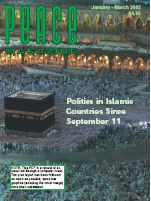
Peace Magazine Jan-Mar 2002, page 31. Some rights reserved.
Search for other articles by PMag staff here
The Nuclear Age Peace Foundation has released its Top Five List of Nuclear Events for 2001. Topping the list is the US notice of withdrawal from the 1972 Anti-Ballistic Missile Treaty. The second spot on the list is the US boycott of an international conference to speed up entry into force of the Comprehensive Test Ban Treaty.
Foundation president David Krieger stated that these decisions "reflect a pattern of US unilateralism that is extremely dangerous in the area of nuclear weapons. It is likely to lead to new regional nuclear arms races, to the proliferation of nuclear weapons, and to competition for the weaponization of space."
Rounding out the Top Five List are the pledge by US President Bush and Russian President Putin to reduce nuclear arsenals, the destruction by the Ukraine of its last nuclear missile silo and Germany's decision to phase out nuclear power by 2025.
(Source: Nuclear Age Peace Foundation.)
In a new television documentary Israeli Foreign Minister Shimon Peres has for the first time disclosed details about Israel's acquisition of nuclear weapons and virtually confirmed its nuclear capability. Along with French officials, Peres described cooperation between Israel and France in launching Israel's nuclear program.
"The Bomb in the Basement: Israel's Nuclear Option" was shown in Israel last month and is being sold to leading Arabic television stations, including Al-Jazeera. The showing of the film may be a sign that the Israeli government is beginning to relax its rule of absolute silence on its nuclear program. Mordechai Vanunu is still serving an 18-year sentence in jail for revealing in 1986 that Israel had a nuclear program and more than 100 warheads. The government cooperated in the making of the film, possibly because of the expectation that Iran could have nuclear capability in a few years. The film reveals that France helped Israel with its nuclear program in exchange for support in the Suez War. In September 1956, Shimon Peres, then a Defense Ministry Official, accompanied Israel's first Prime Minister David Ben-Gurion to France for a meeting with French and British delegations over the Suez crisis. The agreement was reached there, but did not become public knowledge until the mid-1980s. France did not give Israel its nuclear capacity, but it certainly helped the country acquire it. Israel still will not officially confirm or deny making nuclear weapons at the plant near Dimona. This ambiguity is designed to deter Arabs from attacking Israel while avoiding the political fallout of becoming a declared nuclear power.
(source: The Telegraph (UK); 23 December 2001)
Former Iranian president Hashemi Rafsanjani has warned that Palestinian suicide bombers might attack American targets. Such an operation is within the reach of extremist groups such as Hamas and would likely end any prospect for a negotiated peace settlement in Israel. Iran maintains close links with radical Palestinian groups such as Hamas. Until now, Palestinian groups have rarely targeted American facilities or personnel despite U.S. ties with Israel, hoping instead to curry U.S. favor. But since Sept. 11, radical groups might gain by attacking U.S. assets. Hamas sees Chairman Arafat as blocking its goal, a Palestinian state based on Islamic law. Any tough U.S.-Israeli response would likely end any chances for an Israeli-Palestinian settlement. Tehran usually provides Hamas with about $3 million a year, but has hiked this year's funding to nearly $18 million, The (London) Sunday Telegraph reported recently. Hamas would gain from doing attacks on a US target, since it, along with Israel's Prime Minister Ariel Sharon, wants to undercut Arafat's leadership of the Palestinians.
A Hamas attack would cause American deaths and guarantee U.S. support for Sharon's aggressive military policies. The preferred targets might be in Israel, where numerous U.S. businesses employ local residents.
(Source: Stratfor: The Global Intelligence Company)
Norway's Tromso University made Mordechai Vanunu their Honorary Doctor on May 15, and printed all speeches at the ceremony and the seminar, where the case for Vanunu and for nuclear disarmament was presented. Nobel laureate Joseph Rotblat and Mordechai's brother, Meir, gave impressive speeches.
The organizers asked the Ministry of Foreign Affairs to let the Norwegian ambassador in Israel visit Mordechai, hand over the diploma and a special gift (tapestry) to him, and inquire about his situation and prison conditions. This was denied by Israel's Ministry of Justice, on the grounds that "the prisoner cannot receive gifts." (This is not true. He can receive books, magazines, CD records, and the like.)
Source: Fredrik Heffermehl, Norway.

Peace Magazine Jan-Mar 2002, page 31. Some rights reserved.
Search for other articles by PMag staff here